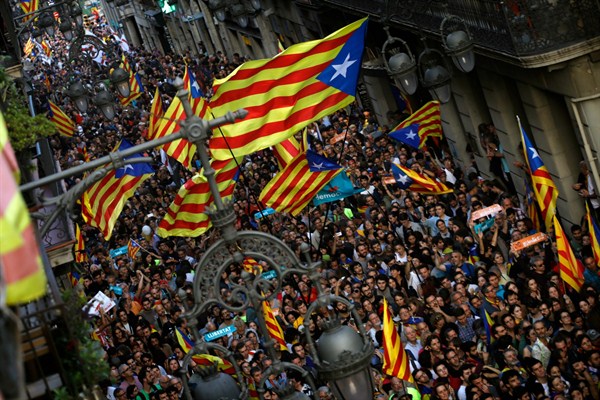“I ask all Spaniards to remain calm. The rule of law will restore legality in Catalonia.” That was Spanish Prime Minister Mariano Rajoy’s response on Twitter to the declaration of independence announced on Oct. 27 by the Catalan secessionist government of Carles Puigdemont. It was also a prelude to Rajoy, hours later, invoking Article 155, a provision in the Spanish Constitution that allowed Madrid to assume direct control of Catalonia, the culturally distinct region of 7.5 million people in northeastern Spain that is wedged next to France. Article 155 had never been used before. Under its authority, Madrid removed from power the Piugdemont administration, took over the Catalan police and ordered new regional elections for Catalonia within six months. Piugdemont’s prosecution on rebellion charges could follow.
The implementation of Article 155 comes after weeks of intense conflict between Madrid and Catalonia over Puigdemont’s decision to hold an independence referendum on Oct. 1. In an attempt to stop the referendum, the Spanish government deployed thousands of national police and civil guard officers to the region to physically prevent people from voting, turning the day into one of the darkest in contemporary Spanish politics. Images of national police officers dragging people from voting stations—including the elderly, some of them with bloodied faces—and firing rubber bullets into the crowds dominated headlines around the world. According to Catalan health officials, 844 people were injured. Politicians from all stripes condemned the violence, with some, including Barcelona mayor Ada Colau, who does not support independence, demanding Rajoy’s resignation.
Unquestionably, Rajoy, who heads the conservative Popular Party, or PP, has allowed what started in 2006 as a dispute over the management of Catalonia’s finances to mushroom into Spain’s biggest political crisis since the country embraced democracy in 1978. From the beginning of his administration, in 2011, Rajoy let it be known that he had no intention of addressing Catalonia’s demands for greater autonomy, an attitude that disappointed even his political allies. Indeed, prior to the referendum, Rajoy ruled out negotiations with Catalan leaders unless they dropped their secessionist plans. This intransigence intensified in the days leading up to the nonbinding referendum, with Rajoy threatening to prosecute officials involved in organizing the vote. He also ordered civil guard officers to seize around 10 million ballots, and even managed to get a Barcelona court to instruct Google to disrupt the internet to prevent people from finding voting stations.

